Best Perennial Shrubs For a Shady Spot
When deciding what to plant in a shady spot, it is important to consider first of all what type of shade you are looking at. Is this location always in deep shade? Is it in dappled light or partial shade? You should also think about whether the shady spot in question is damp or dry, as the plants that will be best suited to one will not necessarily do at all well in the other. Of course you should also think about the type of soil you have in your garden. Deep shade does make it difficult to grow a wide range of plants but whatever challenges you face in your garden, you should think of those challenges as opportunities – you can make a wonderful garden anywhere – you just need to be realistic about what you can and cannot do.
When planting up an area of deep shade, you may be looking at an area beneath mature trees, or a cool site in the shade of surrounding buildings. Either way, it is a good idea to start with the shrub layer and then work your way down. Here are five useful perennial shrubs that are really robust and can cope with a high level of shade:
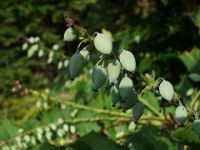 Mahonia
Mahonia
Mahonias are a wide range of evergreen shrubs that prefer partial to full shade and are one of few plants that provide edible berries in those conditions. They are naturally adapted to woodland conditions and will grow well in a wide range of different soil types. Most mahonias are fully hardy. Mahonia berries are high in vitamin C and can be used in making jam or in breads, where the bloom on their skins will help the rise, though they are not good to eat raw and should not be eaten in large quantities.
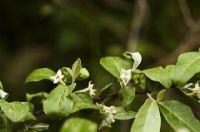 Elaeagnus/ Oleander
Elaeagnus/ Oleander
A number of shrubs in this family are perfect for shade. Another benefit is that many of these plants have nitrogen fixing organisms on their roots and will improve the nitrogen content of soil. (They will also grow well where shrubs requiring more soil nitrogen may not thrive.) These shrubs can also be great for wildlife, birds and beneficial insects. If in partial or dappled shade, autumn olive (Elaeagnus umbellata) will produce tart edible fruits.
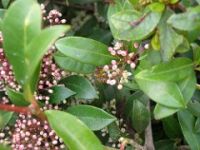 Viburnum
Viburnum
Many of the varieties in this genus are extremely well suited to shady conditions and are generally unfussy and easy to grow. Some viburnums have berries that are edible for humans while others are mildly poisonous. All viburnum are fantastic for the wildlife in your garden and most will provide year-round visual interest and appeal.
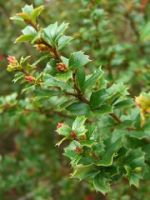 Berberis/ Barberry
Berberis/ Barberry
Several different species of Berberis are well suited for use in shady gardens. These are shrubs that can provide year round interest and thorny varieties can also help with controlling pests or securing a boundary. Some berberis have edible fruits that are very sour but which can be used in jams and jellies.
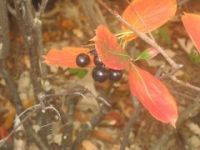 Aronia Melanocarpa
Aronia Melanocarpa
These shrubs are another ornamental that has useful edible berries. The berries of aronia melanocarpa are best in jams and are naturally high in pectin. They will fruit even with a high degree of shade.